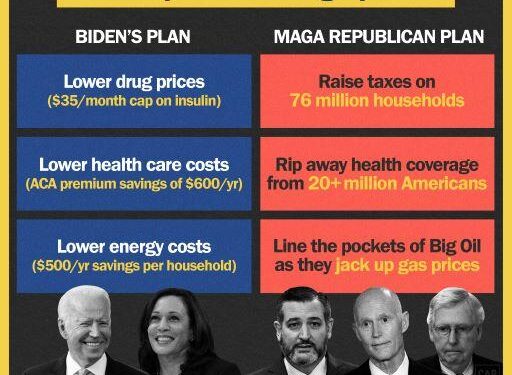As the 2024 election cycle intensifies, a widening rift is emerging within the Republican Party over the legacy and impact of former President Donald Trump’s economic policies. A recent Axios report highlights how MAGA-aligned Republicans and their more traditional counterparts diverge sharply in their assessments of the Trump-era economy. This growing ideological chasm not only reflects deeper political and cultural divides but also signals fresh challenges for GOP unity as candidates and voters grapple with competing visions for America’s economic future.
MAGA Republicans Embrace Trump’s Economic Policies as a Central Pillar of Their Agenda
Among MAGA Republicans, Trump’s economic policies have transformed from campaign rhetoric into a foundational doctrine. They champion aggressive tax cuts, deregulation, and a prioritization of American manufacturing as key drivers of economic growth. This faction consistently highlights the pre-pandemic expansion of jobs and stock market gains under Trump’s administration as proof of the effectiveness of these policies. For them, revisiting and expanding upon tariffs, reshoring supply chains, and curtailing global trade agreements remain essential to ensuring U.S. economic sovereignty.
Contrast this with non-MAGA Republicans, who exhibit more skepticism about doubling down on Trump’s economic legacy. Instead, they advocate for a more tempered, market-friendly approach that balances growth with fiscal responsibility and international cooperation. The divide is clear in their respective priorities, as illustrated below:
| Policy Focus | MAGA Republicans | Non-MAGA Republicans |
|---|---|---|
| Tax Policy | Broad cuts, especially corporate | Targeted relief, with budget balance concerns |
| Trade | Protectionist tariffs and reshoring | Free trade with strategic safeguards |
| Regulation | Maximal deregulation to spur business | Measured regulatory reform for stability |
Non-MAGA Republicans Criticize Economic Strategies Citing Concerns Over Inflation and Fiscal Responsibility
Non-MAGA Republicans have increasingly voiced skepticism over the economic policies championed by former President Trump and his core supporters. Many express concern that aggressive spending measures aimed at stimulating growth have instead exacerbated inflationary pressures, diminishing purchasing power for everyday Americans. These members emphasize the need for a disciplined approach to fiscal management, warning that unchecked deficits may undermine long-term economic stability. Critics within this faction argue that current strategies prioritize short-term political gains over sustainable financial health.
Key concerns highlighted by non-MAGA Republicans include:
- Rapid inflation eroding wage growth and savings
- Rising national debt levels threatening credit ratings
- A lack of targeted investment in infrastructure and innovation
- Overreliance on tax cuts benefiting high-income earners
| Economic Indicator | MAGA Perspective | Non-MAGA Viewpoint |
|---|---|---|
| Inflation Rate | Temporary side effect of growth | Significant risk to consumer stability |
| Federal Deficit | Acceptable to finance stimulus | Needs urgent reduction emphasis |
| Tax Policy | Cutting taxes spurs economy | Prefer balanced, equitable approach |
Bridging the Divide Requires Dialogue on Shared Economic Goals and Pragmatic Policy Solutions
Constructive conversation is essential to reconcile the diverging economic perspectives within the Republican Party. Both MAGA and non-MAGA factions need to identify common ground rooted in sustainable growth and job creation. Emphasizing shared goals such as reducing unemployment, fostering innovation, and securing fair trade practices can serve as a foundation for unified economic strategies. By prioritizing dialogue over division, policymakers can shape frameworks that address the concerns of both sides while advancing national prosperity.
Pragmatic policy solutions must focus on actionable outcomes rather than ideological purity. Key areas for bipartisan collaboration include:
- Infrastructure investment to modernize transportation and broadband access
- Tax reform that balances revenue with incentives for small businesses
- Workforce development programs aligned to emerging industries
The following table highlights how these initiatives could impact economic indicators favored by both factions:
| Policy Area | Expected Outcome | Support Base |
|---|---|---|
| Infrastructure Investment | 5% GDP growth uplift | MAGA & Non-MAGA |
| Tax Reform | 10% growth in small business revenue | Non-MAGA (focus on tax code simplicity) |
| Workforce Development | 15% increase in skilled labor force | MAGA (focus on American jobs) |
Wrapping Up
As divisions deepen within the Republican Party, the contrasting views on Trump’s economic legacy illustrate a broader challenge for its future cohesion. While MAGA supporters continue to champion former President Trump’s economic policies as a blueprint for growth, non-MAGA Republicans express increasing skepticism and call for alternative approaches. How the party navigates this ideological divide could shape not only its economic platform but also its political fortunes in the years ahead.










